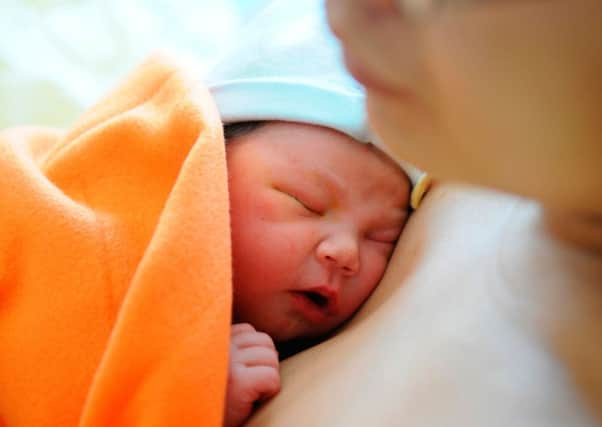Mothers to be sent home sooner after giving birth


Patients seen at NHS Greater Glasgow and Clyde’s maternity units may be directed to “dedicated discharge areas” after having their baby, where they can rest for a few hours, undergo checks and then go home.
It is a change from previous advice, when women attending antenatal classes were told they could expect to stay in for three days, even after straightforward births.
Advertisement
Hide AdAdvertisement
Hide AdThe board said the move was in response to demand from patients to get home sooner rather than a fall in bed numbers, while midwives said it was important staff were involved in any discussions about such changes in practice.
Figures show a decline in maternity beds in Scotland in recent years. Statistics from ISD Scotland show that the number of staffed beds in the obstetrics wards – which include antenatal and postnatal wards – dropped from 921 in 2004 to 756 in 2013.
National guidance says that most women can expect to leave hospital between six and 24 hours after giving birth if there are no complications, but Scottish research shows that in practice the majority (73 per cent) stay in longer than this.
In Greater Glasgow and Clyde, just 21 per cent of women left hospital within 24 hours, according to the survey of over 2,300 Scottish mothers earlier this year which showed wide variations between boards.
NHS Greater Glasgow and Clyde said that after seeing more and more women requesting discharge home within hours of giving birth, they ran a pilot of a “dedicated discharge area” for low-risk births at the Princess Royal Maternity Hospital in Glasgow at the end of 2012.
“Women who requested discharge within hours of birth and whose labour had been low risk were supported and looked after in a dedicated ward area until mum and baby had a full assessment by midwifery staff and were ready for discharge home,” a spokeswoman said.
“The trial proved successful with positive feedback from new mums and this is established in maternity units across Greater Glasgow and Clyde as part of our timely discharge protocols.
“No woman or baby is discharged home before being fully assessed by midwifery staff and a follow-up check at home by the community midwifery team is arranged within 24 hours.”
Advertisement
Hide AdAdvertisement
Hide AdThe Scottish maternity survey published in January revealed that 10 per cent of women believed their length of stay in hospital after birth was too short, while 14 per cent thought it was too long. Most said it was “about right”.
The National Childbirth Trust (NCT) said the approach being taken in Glasgow was welcome if used appropriately. Belinda Phipps, NCT chief executive, said: “This seems a sensible scheme as sometimes new mums want to get home as quickly as possible.”
The Royal College of Midwives (RCM) is currently running a campaign focusing on the importance of high quality care after giving birth.
Gillian Smith, the RCM’s director for Scotland, said there was likely to be a link between declining bed numbers and moves to get women out of hospital sooner after birth in Scotland, as well as demand from the women themselves to leave earlier.
But she said it was important that women were treated based on their needs and not moved on sooner than was appropriate and that staff were properly involved in any discussions about changes being made.
“Each woman has to be treated as an individual and it is not about saying it is a six-hour discharge and you must go home at six hours or 12 hours,” she said. “Each person should be an individual.”
Smith said another good reason for moving women out of hospital quicker after birth was due to links between longer stays and increased risks of infection.
A Scottish Government spokesman said: “Going home can often be preferable and allows women and their families more time to bond with their new baby. However, we expect all NHS boards to provide appropriate person-centred, safe and effective postnatal care which meets the needs of individual mothers and babies.”